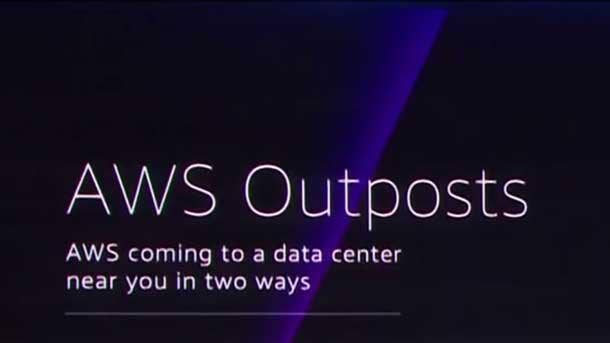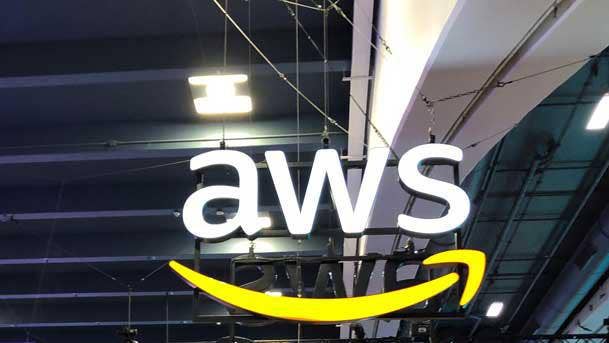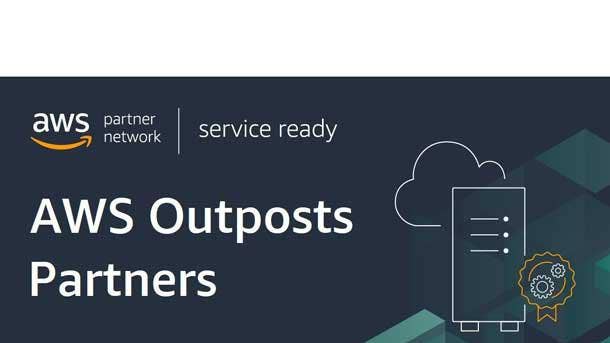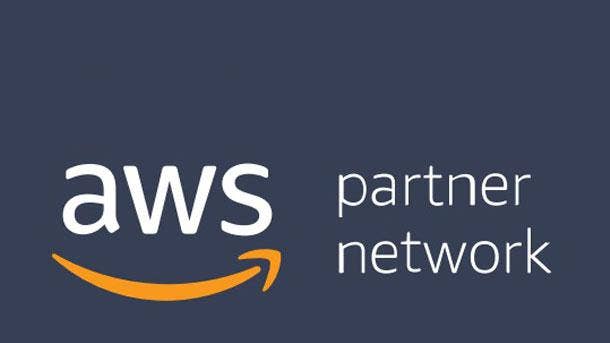AWS Outposts GM: ‘Off-The-Charts’ Interest In Hybrid Cloud Service
‘It really has the potential to help open up new avenues for us and help customers accelerate their cloud migrations by filling this hole that was really difficult for us to address before for all the workloads that need to remain on premises,’ says Joshua Burgin, general manager of AWS Outposts.

Customer interest in AWS Outposts is a reflection of Amazon Web Services getting the fundamental value proposition right for the hybrid solution that launched last December, according to the general manager of the service.
“We’ve really had what I would say is essentially off-the-charts interest from 100 countries around the world and businesses from the public sector to healthcare to manufacturing to online gaming and betting,” said Joshua Burgin, who’s been general manager of AWS Outposts since June. “It’s been kind of impressive the breadth of people that have reached out to us thinking that there might be something to being able to deliver this consistent hybrid experience for the portion of their workloads that have to be in a specific state or a specific country, whether it’s for latency or regulatory reasons. Although it’s still very early days, and there’s lots for us still to learn, I definitely believe…this is one of the most exciting businesses in AWS.”
In fact, Burgin said, that’s why he took his new role after serving for a year as technical advisor and chief of staff for AWS senior vice president Charlie Bell, whose team is responsible for AWS engineering, operations and product.
“It really has the potential to help open up new avenues for us and help customers accelerate their cloud migrations by filling this hole that was really difficult for us to address before for all the workloads that need to remain on premises,” said Burgin, who joined AWS in 1997 as one of its first 100 employees, left his role as senior systems engineer three years later and returned to AWS in 2014, serving as general manager of compute services for five years. “We certainly think that the customer interest is a reflection of AWS getting the fundamental value proposition correct.”
The industry’s leading cloud provider this week announced the AWS Outposts Ready Program that technically validates AWS Partner Network (APN) members’ solutions – including storage, networking, security and industry-specific solutions -- that can be integrated with AWS Outposts deployments. The program, part of the broader AWS Service Ready Program, launched this week with vetted products from 32 APN partners. Additional partners – more than the number announced -- are in the AWS Outposts Ready pipeline, according to Burgin. Those include Deloitte Consulting, which confirmed to CRN that it’s among global systems integrators going through the program.
“The Outposts Ready Program is actually a good example of the (customer) interest that we’re seeing,” Burgin said. “You kind of don’t have to take our word for it -- I don’t think we would have seen 30-plus partners sign up for the work to certify their solutions on Outposts, if they didn’t believe that their customers were going to adopt those solutions as well.”
Click through to see what Burgin had to say about how that customer interest in AWS Outposts is translating into customer adoption, why AWS still has a lot to learn regarding Outposts, channel partner opportunities for the service and what’s coming next for Outposts.
There’s also a full list of the 32 AWS technology and consulting partners that are AWS Outposts Ready launch partners – Amdocs, Cohesity, Dynatrace, NetApp, Palo Alto Networks and Sisense among them -- and their products that have been validated.

Has customer interest in AWS Outposts led to customer adoption?
It’s going about as well as we planned. What I would say is we’re in the very early days with dozens of customers and then headed upwards from there. Obviously, in the early days, it’s always going to be a little bit lumpy. But we have customers like WWT (Maryland Heights, Mo.-based World Wide Technology, also an AWS Advanced Consulting Partner), which is a big systems integrator. They’re standardizing on Outposts as a way to deliver that hybrid experience to their customers, and they have public sector customers all over the world. We have Philips Healthcare, who is also going to be delivering the piece of their workloads that they have to put inside of a hospital or academic medical center on top of an Outpost and then deliver the rest of the workloads like machine learning, training and big data and put that into the cloud. We have a number of other customers that are in the pipeline for case studies, so we’ll have more of those later this fall.
Honestly, what I would hope is that in the fullness of time, we become a meaningful business for AWS. We’d like to have a healthy sense of what we’re doing well and what we still have to do. We’re very excited by the growth of the business, and we’re not sharing any more specific numbers than that.
How big is your AWS Outposts team?
We don’t disclose direct team size. I would say it’s a pretty meaningful size, and it’s growing a hundred percent year over year as we continue to invest in any number of areas.

What did you mean when you said AWS still has a lot to learn regarding AWS Outposts?
That’s something we pride ourselves on with AWS, and it’s one of the advantages of going with a cloud provider -- you can take advantage of the continuous innovation that’s happening all around you. In the early days, when we launched Outposts, we had a small set of workloads in mind that we knew would be really attractive -- things that need ultra-low latency or where there’s a regulatory reason that we can think of where it has to remain in a specific country. We still have lots to learn. We’re always out there listening to customers to hear from them -- what do you want from Outposts, what do you want from AWS, what could this be useful for? And what we’ve been pleasantly surprised with is the breadth of ideas that people have brought to us, whether it’s bringing these partner solutions to the Outposts, so that they can use the same thing they’re using on premises to manage or monitor or secure or provision, or exactly what people envision -- replacing systems inside of a store or enterprise engineering workloads that run inside of a closet inside these major employers. These are not necessarily workloads we thought we would be focused on, but they’re ones that we feel we are reasonably well-positioned to serve. I think, over time, as we bring more services to Outposts directly from AWS or just as well some partners, we’re going to be able to meet all these needs that the customers are bringing our way.
What kind of partners can participate in the AWS Outposts Ready Program?
It’s open to both technology partners and then also consulting and solutions partners. It’s a slightly different set of requirements for them. But a lot of the global system integrators -- I think we have six or seven in the pipeline right now -- are going through the program as well. We have people who see value in being able to have a practice inside their consulting or solutions integration business, where they’re able to deploy or sell or manage people’s Outposts for them in addition to what they’re managing on cloud and on prem.

Were these AWS Outposts Ready products developed specifically for Outposts or are they existing ones that have been retrofitted?
The good news is that most of these are existing products in one form or another. They’re products that are already part of our (AWS) Marketplace and our APN, where they can run on AWS in our regions. And, in some of the cases, like when I think about Veritas (Technologies) or HashiCorp or Sisense or ScyllaDB, which is a NoSQL database company, these are people that not only have cloud solutions, but they also have on prem solutions already. This is the good news for them.
This is why I think we were able to launch with so many partners and, actually, we’re launching this ahead of our original plan for later this year.
The reason that they were able to launch it so quickly is that the Outpost really is kind of the best of both of those worlds. In many ways, it appears like the other on prem hardware and software that they’re familiar with, where they’re already supporting it. And then the other way is, it uses some of the same AWS APIs for EC2 (Amazon Elastic Cloud Compute), for EBS (Amazon Elastic Block Store). Any of the providers that are either working on prem or using AWS, some of them have been able to qualify their solution in as little as a few days with not a lot of engineering effort.

How are you going to execute on this? Who will provide the integration services? Will AWS have to have its own people or these APN partners on site with the customers to get things going?
With most of the software vendors -- even the storage ones like Pure Storage and Qumulo and NetApp -- these are software-based solutions that people can deploy themselves. They also have professional services organizations, but we don’t anticipate that most customers will need on-site support for that any more than they would need support for running the software solutions from these vendors for their on premises equipment or running these solutions inside their AWS account. Some of these…are larger enterprise-grade solutions, and the deployment of them -- when it comes to integrating with your back-end ERP (enterprise resource planning) system or other databases -- require integration effort, but that’s not Outposts-specific. And then, of course, the global systems integrators...the business they’re in is either local or remote integration services.
Are there opportunities for other AWS partners to make money with Outposts?
We don’t have a reseller program. The Outposts are sold directly through AWS. We do work with a small network of colocation providers to make sure that -- for customers who don’t have an existing colo provider or want to move out of their own data center -- we vet the operational and security bar of certain colos, so that we can make good recommendations. Most of (these AWS partners) charge for the solutions we’re talking about here in the Service Ready Program. They can make money in the same way they do deploying services on AWS regions through the Marketplace or through on prem, whether it’s a maintenance contract or a subscription license. We provide all those same capabilities on the Outposts.

When I interviewed AWS CEO Andy Jassy last year, he said while AWS technical personnel will initially handle the installation and maintenance for AWS Outposts, partners are expected to be able to provide those servicesin the future. Is that in the near future?
The way we see it is it’s not dissimilar to our cloud infrastructure in the regions. The Outpost itself is provided and managed by AWS -- so the underlying hardware. And we’re trying to roll it into your data center -- assuming there’s enough room -- and plug it in, and we monitor it and make sure that the RAM and the CPUs and the power supplies keep up and running. On top of that, you can deploy anything including, in some cases, an entire stack by a vendor. When you think of an example like Philips (Healthcare), that’s going to take over the entire Outpost in a hospital, they can have a service contract on top of that, but they’re not servicing the underlying Outpost itself.
It’s something we’ve thought about but haven’t really committed to -- having a specific kind of reseller or channel program for the Outposts. We think where we are now with the business, that people benefit from having that direct relationship with AWS for the Outpost. If it is fully managed -- like the global systems integrators, in some cases, take care of people’s entire IT estate -- in that case, it’s not directly reseller, but it kind of functions like one. If you had outsourced to one of the big four systems integrators your entire IT, and as part of that they deploy Outposts for you, that systems integrator is, of course, marking up the service that they provide through the Outpost.

What’s coming next for AWS Outposts?
The first is that we’re not done with the Service Ready Program. The partner team at Amazon has done a really fantastic job, and there’s so many people that are excited, so I would look throughout the rest of the year for additional people to onboard. We’ve already got -- I’ve mentioned Sisense and Scylla and the Ocean Kubernetes management service from Spot, Amdocs, Pure Storage, Veritas, HashiCorp -- and then you’re going to see many more names through the rest of the year.
S3 is coming soon, so we hope to have an announcement in the very near future with more details about S3 for Outposts. Right now, we have EBS, which is block storage. And, through our partners, we have both file and object storage, whether it’s from Qumulo or Pure Storage -- their FlashBlade. What people have also asked is can we add AWS’ object storage, which is what S3 is. It’s API-compatible, and if you have an application, but you’re running in a region that takes advantage of S3 and those APIs to store and retrieve your data, now you can bring that to the Outpost once we release S3 for Outposts -- without re-architecting your application. It’s one of the foundational building blocks of AWS, and so it’s important that we bring that to Outpost customers as well.
We’re always looking at which services we should bring to the Outpost, which partners we should work with. I hope to see continued momentum on all these fronts -- partners, AWS services, customers. (Customers) asked for ALB, which is our application load balancer, which we just announced last week. One other one I can share is (Amazon) ElastiCache…which is a memory database. That’s being delivered soon. The other things customers have asked for we’ve been delivering. We brought RDS (Amazon Relational Database Service) and EMR (Amazon Elastic MapReduce) to Outposts.
We just jumped from the number of services we had to another 32 with this announcement, and that’s all across deployment, monitoring, security, integration, container management, NoSQL. I’m actually pretty excited, in particular, about how partner solutions enable people to operate on Outposts. It’s, if anything, even more important because many of these are things that they’re using on premises. We’re going to continue to innovate the platform based on what we hear from customers.
AWS Outposts Ready Program Launch Partners